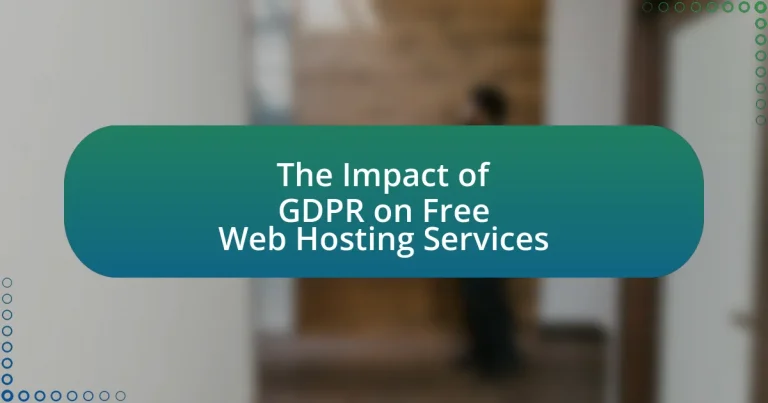The General Data Protection Regulation (GDPR) is a pivotal data protection law in the European Union that significantly impacts free web hosting services by imposing strict compliance requirements regarding the handling of personal data. This article explores the definition of personal data under GDPR, the key principles that govern data processing, and the specific obligations that free web hosting providers must adhere to in order to avoid substantial fines and legal repercussions. It also examines the challenges these services face in achieving compliance, the misconceptions surrounding GDPR applicability, and best practices for managing user consent and data security. Additionally, the article highlights the resources available to assist free web hosting services in navigating GDPR compliance effectively.

What is the GDPR and its relevance to free web hosting services?
The General Data Protection Regulation (GDPR) is a comprehensive data protection law in the European Union that governs how personal data is collected, processed, and stored. Its relevance to free web hosting services lies in the fact that these services often handle personal data of users, making them subject to GDPR compliance requirements. For instance, free web hosting providers must ensure that they obtain explicit consent from users for data processing, implement adequate security measures to protect personal data, and provide users with rights to access, rectify, or delete their data. Non-compliance can result in significant fines, which can impact the sustainability of free web hosting services.
How does the GDPR define personal data?
The GDPR defines personal data as any information relating to an identified or identifiable natural person. This includes data such as names, identification numbers, location data, and online identifiers that can directly or indirectly identify an individual. The regulation emphasizes that personal data encompasses a wide range of information, highlighting its relevance in various contexts, including digital services and web hosting.
What types of data are considered personal under the GDPR?
Personal data under the GDPR includes any information that relates to an identified or identifiable natural person. This encompasses a wide range of data types, such as names, identification numbers, location data, online identifiers, and other factors specific to the physical, physiological, genetic, mental, economic, cultural, or social identity of that person. The GDPR defines personal data broadly to ensure comprehensive protection, as stated in Article 4(1) of the regulation.
How does the definition of personal data impact free web hosting services?
The definition of personal data significantly impacts free web hosting services by imposing strict compliance requirements under regulations like GDPR. Free web hosting services often collect user data to monetize their platforms, and if this data qualifies as personal data, they must adhere to GDPR’s principles, including obtaining explicit consent and ensuring data protection. Non-compliance can lead to substantial fines, as seen in cases where companies faced penalties for mishandling personal data, thus influencing their operational models and potentially limiting their service offerings.
What are the key principles of the GDPR?
The key principles of the GDPR are lawfulness, fairness, and transparency; purpose limitation; data minimization; accuracy; storage limitation; integrity and confidentiality; and accountability. These principles ensure that personal data is processed legally, collected for specified purposes, limited to what is necessary, kept accurate, retained only as long as needed, secured against unauthorized access, and that organizations are responsible for compliance. Each principle is designed to protect individuals’ privacy rights and enhance their control over personal data.
How do these principles apply to free web hosting services?
The principles of GDPR apply to free web hosting services by mandating that these services must protect user data and ensure privacy compliance. Free web hosting providers often collect personal data from users, which makes them subject to GDPR regulations, requiring them to implement measures such as obtaining explicit consent for data processing and providing users with the right to access and delete their data. For instance, a study by the European Commission in 2020 highlighted that non-compliance with GDPR can lead to significant fines, emphasizing the necessity for free web hosting services to adhere to these principles to avoid legal repercussions.
What obligations do free web hosting services have under the GDPR?
Free web hosting services must comply with the General Data Protection Regulation (GDPR) by ensuring the protection of personal data they process. These obligations include obtaining explicit consent from users for data collection, providing transparency about data usage, implementing data security measures, and allowing users to access, rectify, or delete their personal data. Additionally, free web hosting services must appoint a Data Protection Officer if their activities require regular and systematic monitoring of data subjects on a large scale, as outlined in Article 37 of the GDPR. Failure to comply can result in significant fines, as the GDPR imposes penalties of up to 4% of annual global turnover or €20 million, whichever is higher.
What are the potential consequences for free web hosting services that fail to comply with the GDPR?
Free web hosting services that fail to comply with the GDPR may face significant financial penalties, legal actions, and reputational damage. The GDPR imposes fines of up to 4% of annual global turnover or €20 million, whichever is higher, for non-compliance. Additionally, these services could be subject to lawsuits from affected individuals or regulatory bodies, leading to further financial liabilities. Non-compliance can also result in loss of user trust, which is critical for the sustainability of free services that rely on user engagement and data.
What penalties can be imposed for non-compliance?
Penalties for non-compliance with GDPR can include fines of up to €20 million or 4% of the annual global turnover, whichever is higher. These financial penalties are enforced by data protection authorities and can vary based on the severity and nature of the violation. For instance, organizations that fail to implement adequate data protection measures or do not report data breaches within the required timeframe may face these substantial fines. Additionally, non-compliance can lead to legal actions, reputational damage, and restrictions on data processing activities, further emphasizing the importance of adhering to GDPR regulations.
How can non-compliance affect user trust and business reputation?
Non-compliance with regulations like GDPR can significantly erode user trust and damage business reputation. When businesses fail to adhere to data protection laws, users may perceive them as irresponsible or untrustworthy, leading to a decline in customer loyalty. For instance, a study by the Ponemon Institute found that 75% of consumers would stop using a service if they learned it had experienced a data breach due to non-compliance. Additionally, negative publicity surrounding non-compliance can result in a loss of potential customers, as 87% of consumers consider data privacy when choosing a service provider. This illustrates that non-compliance not only jeopardizes user trust but also has tangible repercussions on a business’s reputation and customer base.

How has the GDPR changed the landscape for free web hosting services?
The GDPR has significantly altered the landscape for free web hosting services by imposing strict data protection regulations that these services must comply with. As a result, many free web hosting providers have had to enhance their privacy policies, implement more robust data security measures, and ensure that user consent is obtained for data processing activities. For instance, the requirement for explicit consent has led to changes in how these services collect and manage user data, often resulting in a reduction of free offerings due to increased operational costs associated with compliance. Additionally, the risk of substantial fines for non-compliance has prompted many providers to reconsider their business models, leading to a shift towards paid services or premium features that ensure GDPR compliance.
What adjustments have free web hosting services made to comply with the GDPR?
Free web hosting services have implemented several adjustments to comply with the GDPR, including enhancing user consent mechanisms, improving data protection measures, and updating privacy policies. These services now require explicit consent from users before collecting personal data, ensuring that users are informed about how their data will be used. Additionally, many free web hosting providers have strengthened their data security protocols to protect user information from breaches, aligning with GDPR’s stringent requirements. They have also revised their privacy policies to clearly outline data processing activities, user rights, and contact information for data protection inquiries, thereby promoting transparency and accountability in data handling practices.
What new features or policies have been implemented?
New features and policies implemented in response to GDPR include enhanced data protection measures, user consent management tools, and transparency protocols. These changes ensure that free web hosting services comply with GDPR requirements by providing users with clear options to manage their personal data and understand how it is used. For instance, many services now offer detailed privacy policies and mechanisms for users to access, rectify, or delete their data, aligning with GDPR’s emphasis on user rights.
How have these changes affected service offerings?
The changes brought by GDPR have significantly affected service offerings in free web hosting services by imposing stricter data protection regulations. These regulations require hosting providers to enhance their data security measures, leading to increased operational costs and a shift in service models. For instance, many free hosting services have had to limit their offerings or introduce premium tiers to cover compliance costs, as evidenced by a report from the European Commission indicating that 60% of small businesses faced challenges in adapting to GDPR requirements. Consequently, the availability of truly free services has diminished, and users may encounter more restrictions on data usage and storage.
What challenges do free web hosting services face in GDPR compliance?
Free web hosting services face significant challenges in GDPR compliance primarily due to limited resources and lack of control over data processing. These services often operate on tight budgets, which restricts their ability to implement necessary data protection measures, such as encryption and secure data storage. Additionally, many free hosting providers rely on third-party services for data processing, complicating their ability to ensure compliance with GDPR requirements, such as obtaining explicit consent from users and facilitating data access requests. The European Data Protection Board emphasizes that all entities handling personal data, regardless of their business model, must adhere to GDPR, which places further pressure on free hosting services to navigate complex legal obligations without adequate support or infrastructure.
How do resource limitations impact compliance efforts?
Resource limitations significantly hinder compliance efforts by restricting the availability of necessary tools, personnel, and financial resources required to meet regulatory standards. For instance, organizations with limited budgets may struggle to invest in compliance software or hire specialized staff, leading to inadequate data protection measures. A study by the International Association of Privacy Professionals found that 60% of small businesses cited lack of resources as a primary barrier to GDPR compliance, highlighting the direct correlation between resource constraints and the ability to adhere to legal requirements.
What are the common misconceptions about GDPR compliance among free web hosting providers?
Common misconceptions about GDPR compliance among free web hosting providers include the belief that GDPR does not apply to them due to their free service model and the assumption that they are exempt from data protection obligations. Many free web hosting providers mistakenly think that because they do not charge users, they are not processing personal data in a way that falls under GDPR regulations. However, GDPR applies to all entities that process personal data of EU citizens, regardless of whether the service is paid or free. Additionally, some providers believe that simply having a privacy policy suffices for compliance, overlooking the need for comprehensive data protection measures and user consent mechanisms. These misconceptions can lead to significant legal risks, as non-compliance can result in hefty fines, which can be up to 4% of annual global turnover or €20 million, whichever is greater.

What best practices can free web hosting services adopt to ensure GDPR compliance?
Free web hosting services can ensure GDPR compliance by implementing robust data protection measures, including obtaining explicit consent from users before collecting personal data. This practice aligns with Article 6 of the GDPR, which mandates that personal data must be processed lawfully, fairly, and transparently. Additionally, these services should provide clear privacy policies that outline data usage, retention periods, and user rights, as required by Article 13 of the GDPR.
Moreover, free web hosting services must ensure that data is stored securely, employing encryption and access controls to protect user information from unauthorized access, in accordance with Article 32, which emphasizes the importance of security measures. Regular audits and assessments of data processing activities can help identify potential compliance gaps, ensuring ongoing adherence to GDPR requirements.
Finally, appointing a Data Protection Officer (DPO) can facilitate compliance efforts by overseeing data protection strategies and serving as a point of contact for users regarding their data rights, as stipulated in Article 37. By adopting these best practices, free web hosting services can effectively navigate the complexities of GDPR compliance.
How can free web hosting services effectively manage user consent?
Free web hosting services can effectively manage user consent by implementing clear and transparent consent mechanisms that comply with GDPR requirements. These services should provide users with explicit options to agree to data processing activities, ensuring that consent is informed and specific. For instance, they can utilize checkboxes that require users to actively opt-in rather than relying on pre-checked options. Additionally, free web hosting services must maintain detailed records of user consent, including timestamps and the specific purposes for which consent was granted. This approach aligns with GDPR mandates, which emphasize the necessity of demonstrable consent for data processing. By adopting these practices, free web hosting services can enhance user trust and ensure compliance with legal standards.
What methods can be used to obtain and document user consent?
To obtain and document user consent, organizations can utilize methods such as explicit opt-in forms, consent management platforms, and recorded verbal agreements. Explicit opt-in forms require users to actively agree to terms before data collection, ensuring clarity and compliance with GDPR requirements. Consent management platforms streamline the process by allowing users to manage their preferences and providing a centralized record of consent. Recorded verbal agreements, when properly documented, can serve as valid consent under GDPR, provided they meet the necessary criteria for clarity and intent. These methods are effective in ensuring that user consent is both obtained and documented in a manner that aligns with legal standards.
How can services ensure users are informed about their data rights?
Services can ensure users are informed about their data rights by providing clear, accessible privacy policies and regular communication regarding data practices. Transparency is mandated by the General Data Protection Regulation (GDPR), which requires organizations to inform users about their rights, including the right to access, rectify, and delete personal data. Services can implement user-friendly interfaces that highlight these rights, utilize notifications or reminders about data rights, and offer educational resources such as FAQs or webinars. Compliance with GDPR not only fosters trust but also protects organizations from potential legal repercussions, as failure to inform users adequately can result in significant fines.
What security measures should free web hosting services implement to protect personal data?
Free web hosting services should implement encryption, secure access controls, regular security audits, and data anonymization to protect personal data. Encryption ensures that data is unreadable to unauthorized users, while secure access controls limit data access to authorized personnel only. Regular security audits help identify vulnerabilities and ensure compliance with regulations like GDPR, which mandates strict data protection measures. Data anonymization further protects personal information by removing identifiable details, reducing the risk of data breaches. These measures collectively enhance the security framework necessary for safeguarding personal data in compliance with GDPR requirements.
What role does encryption play in data protection under the GDPR?
Encryption plays a critical role in data protection under the GDPR by ensuring that personal data is rendered unintelligible to unauthorized individuals. This is significant because the GDPR emphasizes the importance of implementing appropriate technical and organizational measures to safeguard personal data, and encryption is recognized as a key method for achieving this. Specifically, Article 32 of the GDPR mandates that data controllers and processors implement measures such as encryption to protect data against breaches, thereby reducing the risk of harm to individuals in the event of a data compromise. By utilizing encryption, organizations can demonstrate compliance with GDPR requirements and enhance the security of personal data, ultimately fostering trust and accountability in data handling practices.
How can free web hosting services conduct regular data audits?
Free web hosting services can conduct regular data audits by implementing automated monitoring tools that track data access and usage. These tools can generate reports on data handling practices, ensuring compliance with GDPR requirements. Additionally, hosting services should establish a routine schedule for manual audits, reviewing data storage and processing activities to identify any discrepancies or unauthorized access. Regular training for staff on data protection policies further enhances the effectiveness of these audits, ensuring that all personnel are aware of compliance obligations.
What resources are available for free web hosting services to navigate GDPR compliance?
Free web hosting services can utilize several resources to navigate GDPR compliance effectively. Key resources include GDPR compliance checklists, which outline necessary steps for data protection, and online courses that provide training on GDPR principles and requirements. Additionally, legal templates for privacy policies and data processing agreements are available to help services align with GDPR mandates. Websites like the European Commission’s official GDPR portal offer comprehensive guidelines and updates on compliance obligations. Furthermore, community forums and support groups can provide shared experiences and solutions from other web hosting providers facing similar challenges.
What organizations provide guidance and support for GDPR compliance?
Organizations that provide guidance and support for GDPR compliance include the European Data Protection Board (EDPB), the Information Commissioner’s Office (ICO) in the UK, and the Data Protection Authorities (DPAs) in each EU member state. The EDPB offers guidelines and recommendations to ensure consistent application of GDPR across Europe, while the ICO provides resources and tools for organizations in the UK to comply with data protection laws. Additionally, DPAs in individual countries assist businesses by offering advice, conducting audits, and enforcing compliance measures. These organizations play a crucial role in helping entities navigate the complexities of GDPR regulations effectively.
How can free web hosting services stay updated on GDPR developments?
Free web hosting services can stay updated on GDPR developments by subscribing to legal and regulatory newsletters, attending industry conferences, and following authoritative sources such as the European Data Protection Board. These actions ensure that hosting providers receive timely information about changes in GDPR regulations and best practices for compliance. For instance, the European Data Protection Board regularly publishes guidelines and updates that are crucial for understanding GDPR implications. Additionally, engaging with legal experts or consultants specializing in data protection can provide tailored insights and interpretations of GDPR changes relevant to their operations.




